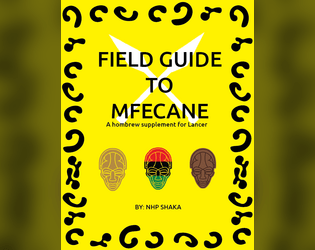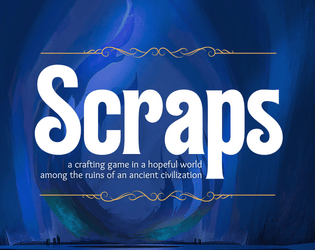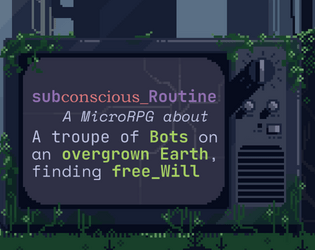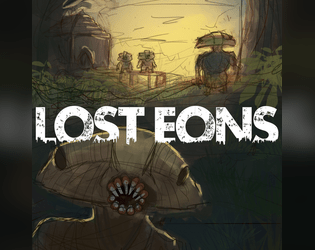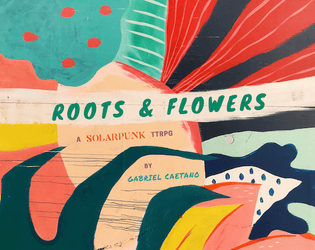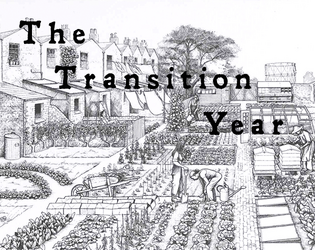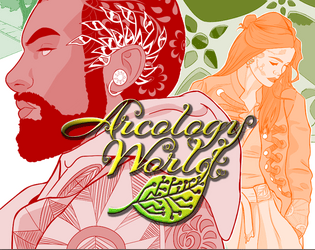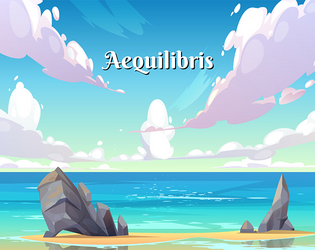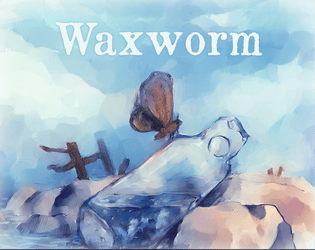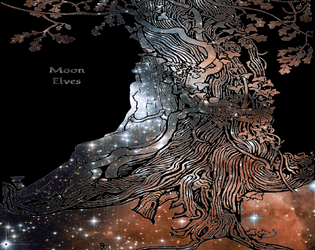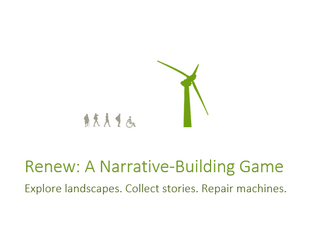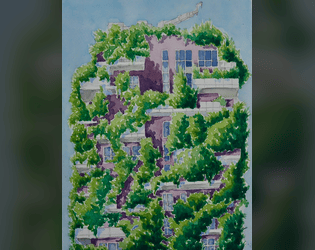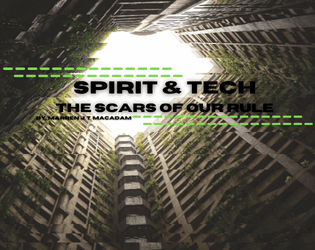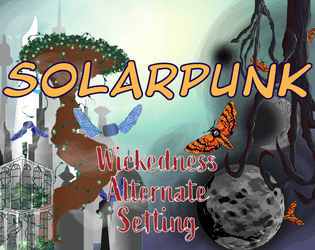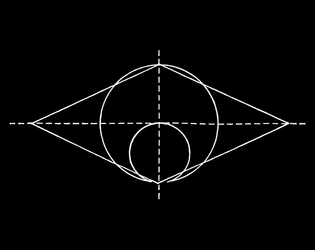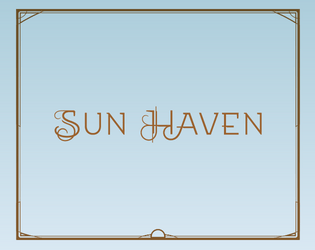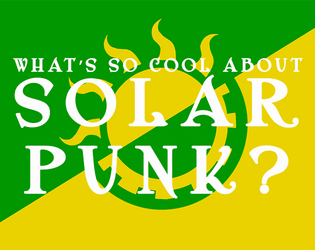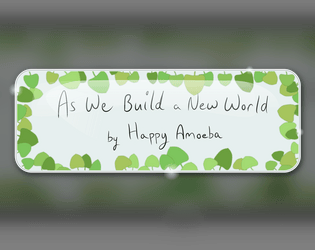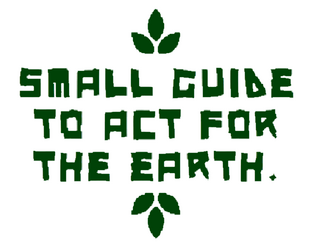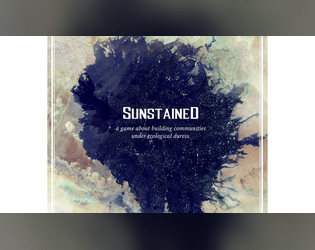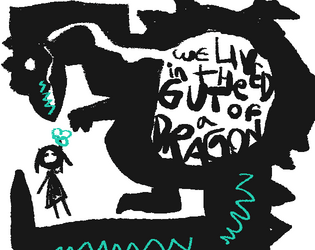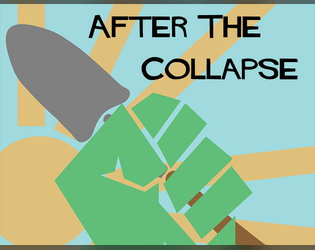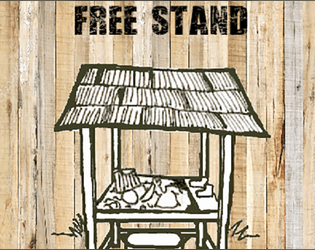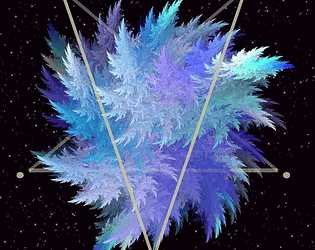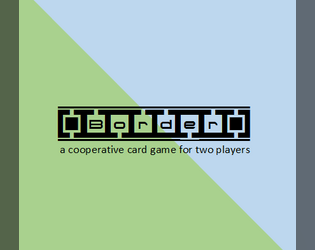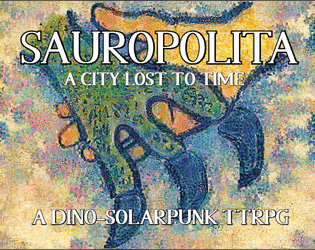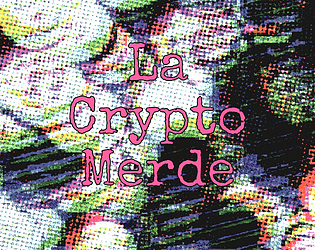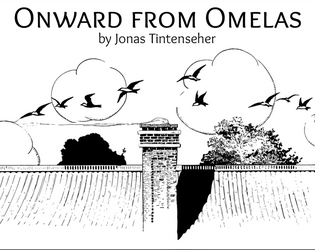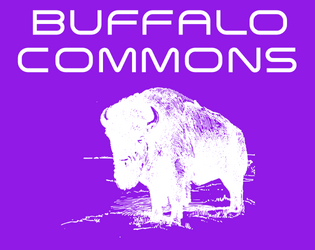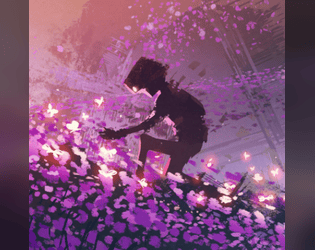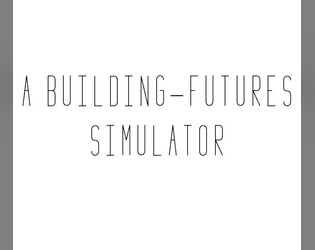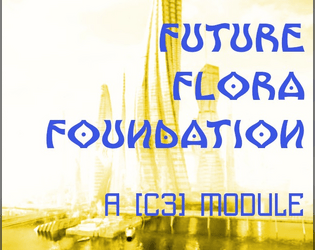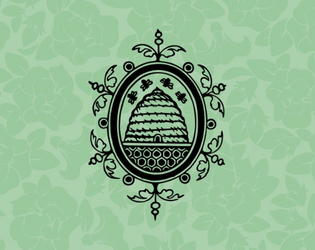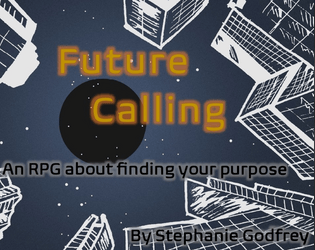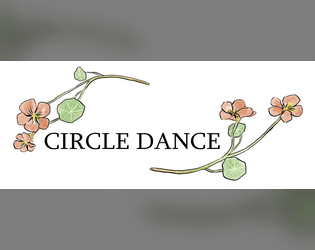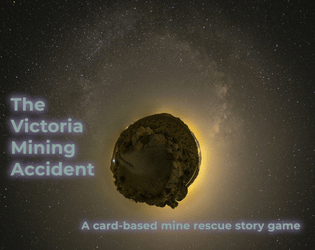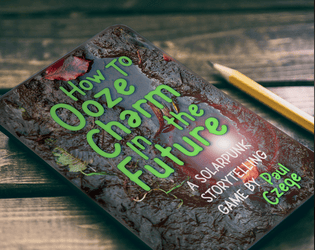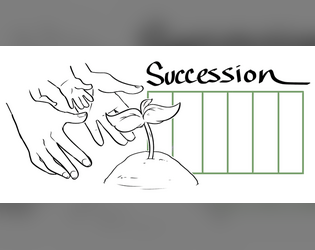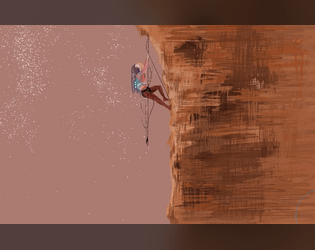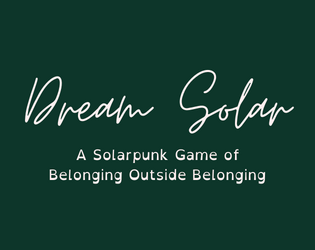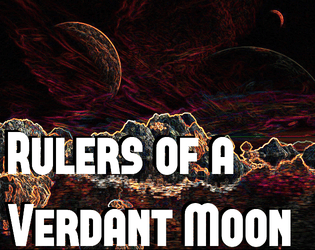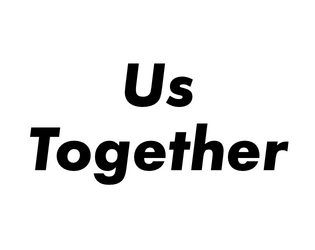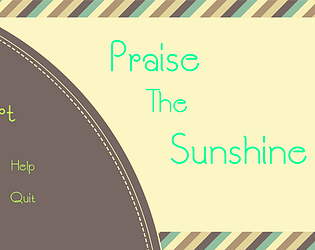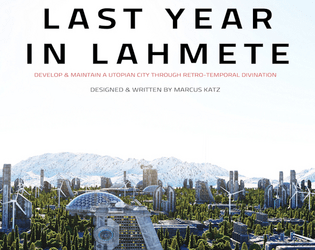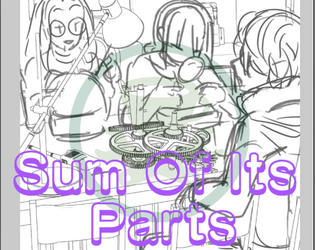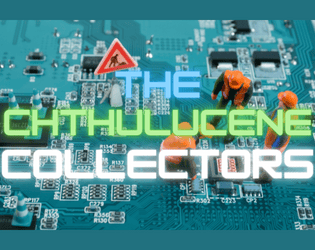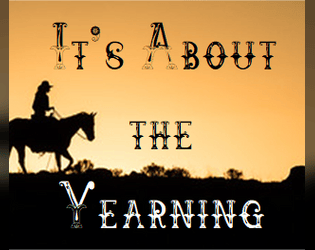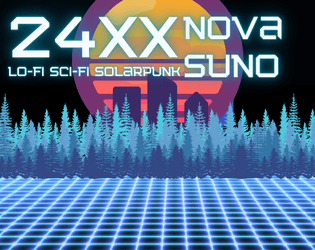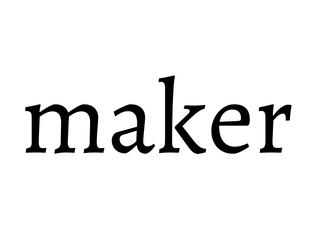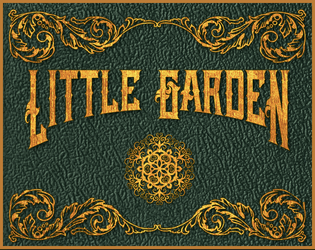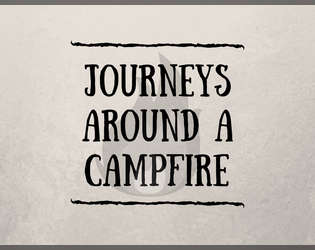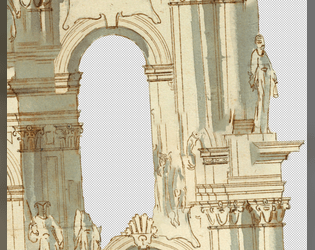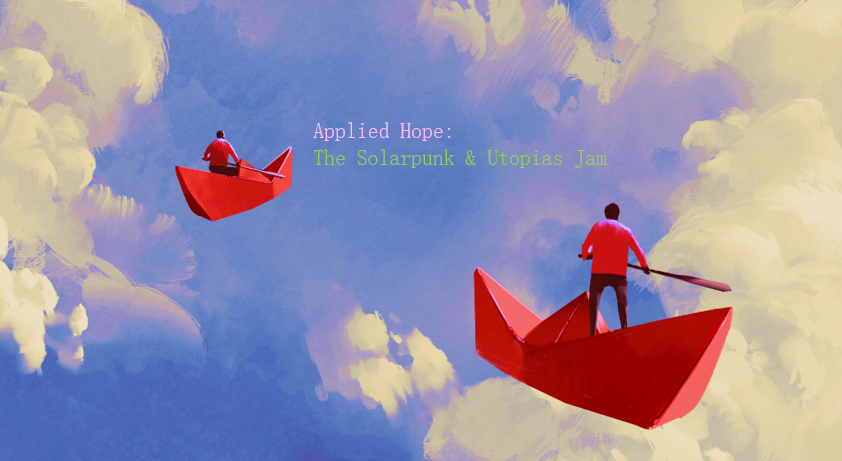
This jam is now over. It ran from 2021-05-31 23:00:00 to 2021-08-31 23:00:00. View 58 entries
TL;DR: Applied Hope is a jam about solarpunk and/or utopian thinking and practice. Define ‘solarpunk’ and/or ‘utopia’ any way you like. Your goal is to create a game or anything you like. Have fun. Be weird. There will be some prizes, mostly for analogue games.
UPDATE: Thank you everyone who participated! Check out the entries! Prizes will be announced in January 2022.
Welcome to Applied Hope: the Solarpunk & Utopias Jam. This is a jam for games, settings, tools, generators, stories, artworks and experiments, that can inspire and explore brighter futures, no matter how messy and complicated those futures may be.
There are loads of specific suggestions below. All in all this is a jam about imagining many possible worlds — worlds filled with new ways of organizing society, worlds filled with adventure, excitement, and unpredictability.
The word “utopia” is in there, but it’s not really a jam about “perfect” societies where nothing ever changes. Nor is it a jam about “fake perfect” societies that turn out to be the absolute worst.
This is a jam about using games to generate hopeful stories and scenarios about the future, to enrich our collective imagination and our capacity to feel joy about the future, to come up with ideas we might otherwise never think of, and to focus on details we might otherwise miss . . .
Prizes
$700 in prizes will be awarded, mostly for analogue games (such as tabletop roleplaying games, TTRPGs):
- Best Game Under Five Pages ($100)
- The Lustrous Effervescing Fontanelle of Luminous Mutable Futures Award ($100)
- The Climate Resilience Award ($100)
- Mx Congeniality ($100)
- Best Game About Something Very Specific ($100)
- Best Solarpunk DIY Game ($100)
- Green Agon Award ($100)
- One specially chosen game will have an original illustration created for it by Ewerton Lua (priceless)
- Some winners may also be invited to have their work published in a special collection
See 'Terms and Conditions' for more information. We gratefully acknowledge the support of Ping Press and the Sussex Humanities Lab in making this games jam possible.
Discord Server
For anyone participating in the jam or just curious, there is now a Discord server, Utopia on the Tabletop. Other recommended Discord communities:
- FKR Collective
- Conjured Games
- RPG Creation
- Storytime RPG
- Wannabe Games
Who Can Submit
Anyone, and we ESPECIALLY welcome submissions from BIPOC creators and other groups that have been historically underrepresented in game development.
Other Jams
Also check out THE SOLARPUNK Jam and Dev the Solution https://itch.io/jam/Dev-the-solution. You're welcome to enter things to this jam and other jams too.
Quotations
- “Utopia should be understood as a method rather than a goal.” — Ruth Levitas.
- “Solarpunk is an eco-futurist movement which tries to think our way out of catastrophe by imagining a future most people would actually like to live in, instead of ones we should be trying to avoid.” — Connor Owens.
- “It’s easier to imagine the end of the world than the end of capitalism.” — Fredric Jameson / Slavoj Žižek / Mark Fisher / other.
- “A good science fiction story should be able to predict not the automobile but the traffic jam.” — Frederik Pohl.
- “Why is it so hard to couple radical politics with a utopia worthy of the name?” ― S.D. Chrostowska
Inspiration
You could take inspiration from a STORY such as …
- Stories in Everything Change: An Anthology of Climate Fiction (CSI)
- Stories in Everything Change: An Anthology of Climate Fiction Vol. II (CSI)
- Stories in Everything Change: An Anthology of Climate Fiction Vol. III (CSI)
- Stories in The Weight of Light: A Collection of Solar Futures (CSI)
- Stories in Cities of Light: A Collection of Solar Futures (CSI)
- Stories in Sunvault: Stories of Solarpunk and Eco-Speculation
- Stories in Gross Ideas: Tales of Tomorrow’s Architecture
- Stories in Shine: An Anthology of Optimistic Science Fiction
- Classic utopian fiction (or adjacent) such as Edward Bellamy’s Looking Backward, William Morris’s The News from Nowhere, Mary E. Bradley Lane’s Mizora, Nikolay Chernyshevsky’s What Is To Be Done?, Begum Rokeya’s Sultana’s Dream, Alexander Bogdanov’s Red Star, or Aldous Huxley’s Island.
- Modern ‘critical’ utopian fiction (or adjacent) such as Ursula K. Le Guin’s The Dispossessed: An Ambiguous Utopia, Marge Piercy’s Woman on the Edge of Time, Joanna Russ’s The Female Man, Ernest Callenbach’s Ecotopia, Samuel R. Delany’s Trouble on Triton: An Ambiguous Heterotopia, Iain M. Banks’s Culture series, Octavia Butler’s Parable duology, Starhawk’s The Fifth Sacred Thing, Kozue Amano’s Aria, or Kim Stanley Robinson’s Pacific Edge.
- Very recent ‘critical’ utopian fiction (or adjacent) like Malka Older’s Infomocracy and its sequels, Cory Doctorow’s Walkaway, Kim Stanley Robinson’s Ministry for the Future, Carl Neville’s Eminent Domain, or Yanis Varoufakis’s Another Now: Dispatches from an Alternative Present.
Can you create TTRPGs that let players explore beyond the edges of these stories, and imagine these worlds in fine-grained detail? Can you come up with worldbuilding generators which could have created these worlds, along with many other worlds?
Can your game explore the flaws, downsides, drawbacks, and unintended consequences of these societies, and harness the players’ imaginations to solve those problems? How might these worlds evolve and transform? Can you extrapolate where these societies might end up fifty or a hundred years later?
Might new societies, built to meet the threat of climate change, be torn apart by climate change? What else might threaten these societies, and who believes they’re worth fighting for? How might these societies defend themselves from threats without losing their identity in the process?
How might an ecovillage or intentional community, or permaculture-based organisation or community, cope with hazards of a fantastical, supernatural, and/or speculative nature?
Can your game focus on an underexplored aspect of these worlds? Fill in the fine detail about some small place, person, or aspect? Help us explore these worlds from completely different perspectives? Can these worlds maybe be mashed together?
What new forms of adventure and conflict arise in relatively more just and sustainable societies? Can you give more practical detail about the speculative elements of these stories? What does it feel like to live in them? Can you fill in the intriguing gaps in the worldbuilding? Can you create rules to simulate their speculative elements? Can older works be brought up to date?
Things You Can Submit
Things that are welcome include EVERYTHING, for example ...
- TTRPGs
- Exercises and activities
- Lyric games
- Serious games
- Hacks
- Generators
- Worldbuilding tools
- Adventures and scenarios
- Supplements and resources
- Incursions
- Procedures and standards
- Manifestos
- Artworks
- Assets
- Video games
- Design guides / standards / principles / tips
- The strange and unclassifiable
It’s all good, but please note the prizes are MOSTLY there for the analogue submissions such as TTRPGs.
Length
Submissions can be any length BUT the judge(s) will only read up to ten pages per submission (or if it’s a video game, play 20 minutes of gameplay). If you want to submit something longer, you can always add a note, “Read pages xx-xx, they’re the best bit.”
More Inspiration
You could explore a THEME such as …
... climate change and ecological crisis, Afrofuturism and Indigenous Futurisms, transformative justice and anti-carceral feminism, reparations for slavery, hopepunk, solarpunk, greenpunk, and other -punks, “punkpunk,” transformative visions of the future that are NOT “punk,” the future of work, transitions to ecological sustainability at every level of society, permaculture, DIY, frugal innovation, Jugaad, open innovation, reverse innovation, witchcraft, mapping / counter-mapping / radical cartography, deglobalization and alterglobalization, alternative and citizen media, post-work and anti-work, robots / automation / AI, PbtA 2.0 (whatever that is), belonging outside belonging 2.0 (whatever that is) …
… re-commoning and re-rooting, localism, municipalism, new forms of collective action, new forms of community, resistance to extractivism, energy futures, geoengineering and climate technology, all the ripples decarbonization will send through all areas of society, workplace democracy, recommoning and governing the commons, games about black ops and the undercommons, games about greenwashing, games about certification, games about offsetting …
… queer publics and queer world-making, critical kinship studies, games as diagnostics, games as democratic tools, games as reparative spaces, machine generated TTRPGs, AI and policymaking, smart regulation, democratising healthcare, consensual non-monogamy, colonialism and decoloniality, critical humanism and posthumanism, imaginary voyages and philosophical novels, utopian folk horror, retro futurisms, the future of mental health, neurodiversity, anti-psychiatry, insurgency and revolution, violence / non-violence / ‘not-non-violence,’ solastalgia and grief, surrogacy and family abolitionism …
... post-scarcity, degrowth and post-growth, the future of religion and spirituality, paranoid and reparative reading practices, architecture and infrastructure, critical pedagogy, more-than-human justice, the future of military conflict, left-accelerationism and techno-utopianism, smart cities and surveillance capitalism, critical design, critical play, critical management studies, critical innovation studies …
... serious and applied games, play therapy, political activism and organizing, revolt and revolution, participatory democracy, de-anthropic play, de-anthropic utopianism, intentional communities, governing the commons, speculative economics, aleatoric writing and procedural generation, critical gamification, AI, Quantified Self, ambient computing and SHINE, Mixed Reality, and other digital technologies ...
You could EXTRAPOLATE from proposals, manifestos, and campaigns, or imagine SCALING UP pilot schemes, alternative organizations / communities, and diverse economic practices which already exist. E.g. check out ...
- Ecovillages Solutions Library
- A. Kirsten Mullen and William A. Darity Jr.’s From Here to Equality: Reparations for Black Americans in the Twentieth Century
- Kate Raworth’s Doughnut Economics: Seven Ways to Think like a 21st-Century Economist
- Breanne Fahs (ed.)’s Burn it Down! Feminist Manifestoes for the Revolution
- Eric Olin Wright’s Envisioning Real Utopias
- Danny Cullenward and David G. Victor’s Make Climate Policy Work
- J.K. Gibson-Graham’s A Postcapitalist Politics
- David Graeber’s Debt: The First 5,000 Years
- Routledge Companion to Alternative Organisation
- Black Lives Matter, CoFutures, Common Wealth, Foundation for Intentional Communities, Future of Money Award, Global Justice Now, Independent Workers Union of Great Britain, Jubilee Debt Campaign, LETS, Mondragon, m-cult, Open Rights Group, Positive Money, Marinaleda, Permaculture Association, Restorative Justice Council, Shelterforce, Stir to Action, Transition Network, Trans Health Manifesto, UBI, Valve’s flat hierarchy, Wellbeing Economy Alliance
You could explore a QUESTION, such as …
- How can a playable activity drive change in a specific kind of organization / community / stakeholder group?
- How will the big changes affect x, where x is something very particular and small?
- How might a future society work where justice and the law have been transformed beyond all recognition? What kinds of troubleshooters might the players be, and how would they interact with other troubleshooters?
- Even if we do everything right in the coming years, sea levels will rise. What pressures and transformations will occur as coastal regions become uninhabitable?
- What else is climate modelling (see e.g. IPCC) telling us about the coming transformations of our environment, and what choices and conflicts lie ahead?
- How can a playable activity allow stakeholders in some strategy or policy process to see their relationships differently?
- How might a classic fantasy setting (D&D etc.) better reflect the true diversity (and often from a modern perspective, the true strangeness) of real world economics and law across the world and across the ages?
- How might intentional communities (maybe of the Belonging Outside Belonging variety?) start to scale?
- Can you create mechanics to model post-commodity economies?
- What kind of stories and adventures play out in a post-work society?
- How can games help us not just to imagine better futures, but to apply our imaginations to really begin to build those futures?
- Can games be created to help us as individuals and organizations to build skills and solidarity for meeting the challenges of climate change?
- What might crime fiction roleplaying be like in a post-carceral society?
- Can TTRPG gameplay integrate research and/or interdisciplinarity in new ways?
- ‘Gamification’ has a mixed reputation nowadays. Can we revitalise gamification, so it’s a bit less about scoring points, unlocking achievements, and driving engagement, and a bit more about the full rich transformative potential of play … ?
You could try a METHOD of game design you haven’t tried before, such as …
- Hacking an existing mini-TTRPG (here are some beautiful ones)
- Collaborating with a text-generating AI (e.g. AI Dungeon)
- Using Sad Press’s RPG Generator to create a starting point
- Creating a game with friends in a design sprint / short form jam (tips and ideas)
- Collaborate with someone who isn’t a game designer or writer or artist (e.g. a scientist, an engineer, a humanitarian worker)
- See Anna Anthropy’s Rise of the Videogame Zinesters for more ideas
You could try making SOMETHING DIFFERENT FROM WHAT YOU USUALLY DO, for example …
- If you usually make games based on a whole fantastic world, make a game focused on a small moment or activity (or vice versa)
- If you usually make video games, try making a TTRPG or other analogue game (or vice-versa)
- If you usually make training activities or serious games, try making games focused on entertainment (or vice-versa)
- If you usually make OSR type games, try a PbtA type game (or vice-versa)
- If you usually make games for experienced TTRPG players, try making games for complete beginners (or vice-versa)
- If your TTRPGs usually tell stories that last weeks or months or years, try making TTRPGs whose stories unfold over seconds or centuries (or vice-versa)
- Focus on a materiality other than dice (e.g. cooking, music, drawing, gathering data, moving around outside)
- Explore using Rooted in Trophy or other mechanics designed for horror / doom / despair against the grain
- Try make something really experimental, something almost-a-game ...
Frequently Asked Questions
Does it have to be post-capitalist? No, it can be anything.
Does it have to be anarchist? No, it can be anything.
Does it have to be libertarian? No, it can be anything.
Does it have to be eco-socialist? No, it can be anything.
Does it have to be socialist? No, it can be anything.
Does it have to be set on Earth? No, it can be set anywhere.
Does it have to be set in the future? No, it can be set anywhen.
What do the award names mean? They’re mostly just silly. The “best game under five pages” one is self-explanatory and the “climate resilience” one will go to something about climate change. "Best game about something very specific" is hopefully sort of self-explanatory, i.e. a game that is very niche or specialist, or explores one aspect of a possible society or institution very thoroughly. The "Best Solarpunk DIY game" prize will be for something themed on making stuff (e.g. an adventure where the players have to go on various fetch-quests to create something useful for the community, or an educational activity which gamifies actually building something). "Green Agon Award" will go to a game that manages to invoke a sense of legitimate disagreement and rivalry among positive and good faith visions of the future, if there is a game like that which is really good; otherwise it will just go to some really good game. Other than that, there are no fixed criteria … we’ll award prizes to whatever submissions feel original / beautiful / inspiring / useful / some other good thing.
How fantastical / realistic does it have to be? It’s your call. It would be really great to see some submissions that extrapolate in a really rigorous way around speculative but plausible premises.
Does it have to be, like, happy? Not really. It definitely doesn’t have to be upbeat in tone, texture, etc. Hope can come in many guises, some of them grim, gloomy, plunged in shadow. Kim Stanley Robinson says, “to be meaningful a story has to match the facts of the situation—it has to be ‘realistic.’ If it doesn’t include and somehow face up to catastrophe, tragedy, and death, it won’t really be creating much of a meaning. Meaning has to be constructed against the most enormous pressures of meaninglessness” (Introduction to Everything Change Vol. II).
There's going to be a book? See below, Utopia on the Tabletop.
This is so amazing, I am so excited, can I help in other ways? Well ... it would be great if we could offer more prize money! If you want to donate, or have ideas about funding, get in touch. Or if you just want to hang out and maybe meet others and collaborate, you could try the Discord (and / or other great Discords like FKR Collective & Conjured Games).
Can I submit the same game to this jam and to other jams? We are totally fine with that!
Further Reading / Watching / Playing
- Worldbuilding Inspiration - lots of books (mostly non-fiction) to explore
- The Futures Toolkit - using playable formats to scope the future
- Applied Speculation: Resources and Inspiration - science fiction and futures thinking
- Decolonising Utopia Resource List
- Red Cross Red Crescent Climate Centre Games Toolkit
- Intergalactic Memorial Carnival
- Economic Science Fiction
- Instructables
Game Engines etc.
If you want to make a video game but don’t code, there are plenty of tools out there to help. Twine is really popular for text-based games, and Bitsy is a cute minimalist in-browser game engine for interactive narratives. Or here’s a big list of game engines (if you have your own opinions, feel free to add comments).
Utopia on the Tabletop
Some game jammers may be invited to publish their work in a volume called Utopia on the Tabletop (Sad Press 2022). This will be a collection of essays by academics, designers, and artists on the theme of utopian play, plus a few specially chosen games (and maybe other things). It will be available digitally and in print. If your work is chosen, you’ll get the benefit of editorial support, and potentially also a small amount of artwork and design investment. You’ll also get a copy of the book.
Contributors will also have the option to accept either (a) a one-off $25 license fee, (b) two additional copies of the book, or (c) participation on a profit-share basis (but it's not going to make us rich or anything. More information here).
The kind of thing that is most likely to be selected is a 3-5 page text-heavy mini-TTRPG or TTRPG resource, that doesn’t have too much complex formatting or artwork.
The book will probably be in a 6”x9” format, although that's not 100% confirmed yet.
Terms and Conditions
(1) The big condition is this: to be eligible for a cash prize, you’ll need to give permission for a playable version of your creation to be freely shared, e.g. under a Creative Commons license (such as CC-BY-ND 4.0). If you’d prefer not to do that, you are still the official winner of the award (fame and glory etc.), but you can’t collect the coins.
By "playable version" we either mean the game just as you submit it or, if you prefer, a text-only System Reference Document that contains everything players need to play, but without all the artwork from the paid version. Some publishers do this anyway, to give people an idea of what they might be buying, to encourage hacks, etc.
(2) The titles of the prizes may change to reflect the most valuable and interesting features of the submissions received. (In fact, we’re open to suggestions if you want to change the name of the prize you’ve won).
(3) Receiving prize money is not dependent on agreeing to publication in Utopia on the Tabletop. You can win a prize, and feel you just want to do your own thing with it: that is perfectly okay.
(4) Ideas are not copyrightable, but expressions of ideas are. That’s the way with creators; they’ll nab anything, carefully remove the uniquely identifying features, and claim it for their own. We can give you some advice on copyright if you need it (but we’re not lawyers), as well as citational ethics. Usually the game design community is pretty good at knowing what it’s doing.
(5) If we get fewer submissions than expected, we’ll extend the length of the jam, and/or award fewer prizes as follows: with fewer than 20 submissions, we may only award three prizes; with fewer than 10 submissions, we may only award one prize. (That said, if we get just six submissions but they’re all amazing we may just go ahead and award everybody a prize!)
(6) The same game could technically win more than one prize (but it probably won't).
(7) At least one prize will be awarded to a contributor from the Global South.
More Quotations
“I am not free while any woman is unfree, even when her shackles are very different from my own.”
― Audre Lorde
“A map of the world that does not include Utopia is not worth even glancing at, for it leaves out the one country at which Humanity is always landing. And when Humanity lands there, it looks out, and, seeing a better country, sets sail. Progress is the realisation of Utopias.”
― Oscar Wilde
“The theory and practice of revolution is bound to the way the individual emerges as a theoretical possibility and phenomenological actuality in and out of the revolutionary ensemble.”
― Fred Moten
“Revolution is not a one time event.”
― Audre Lorde
“Freedom is always, and exclusively, freedom for the one who thinks differently.”
― Rosa Luxemburg
“We can only know what we can truly imagine. Finally what we see comes from ourselves.”
― Marge Piercy
“[...] despite everything that has been written about capitalism, we still struggle to understand its dynamics and its mechanisms. Most importantly, we lack a ‘cognitive map’ of our socioeconomic system: a mental picture of how individual and collective human action can be situated within the unimaginable vastness of the global economy.”
― Nick Srnicek and Alex Williams
“Normally, when you challenge the conventional wisdom—that the current economic and political system is the only possible one—the first reaction you are likely to get is a demand for a detailed architectural blueprint of how an alternative system would work, down to the nature of its financial instruments, energy supplies, and policies of sewer maintenance. Next, you are likely to be asked for a detailed program of how this system will be brought into existence. Historically, this is ridiculous. When has social change ever happened according to someone’s blueprint? It’s not as if a small circle of visionaries in Renaissance Florence conceived of something they called “capitalism,” figured out the details of how the stock exchange and factories would someday work, and then put in place a program to bring their visions into reality. In fact, the idea is so absurd we might well ask ourselves how it ever occurred to us to imagine this is how change happens to begin.”
― David Graeber
“Today, one of the most pervasive and subtle aspects of hegemony is the limitations it imposes upon our collective imagination. The mantra ‘there is no alternative’ continues to ring true, even as more and more people strive against it. This marks a significant change from the long twentieth century, when utopian imaginaries and grandiose plans for the future flourished.”
― Nick Srnicek and Alex Williams
“[...] utopian thought recognises that the future is radically open. What may appear impossible today might become eminently possible. At their best, utopias include tensions and dynamism within themselves, rather than presenting a static image of a perfected society. While irreducible to instrumental concerns, utopias also foster the imagination of ideas that might be implemented when conditions change.”
― Nick Srnicek and Alex Williams
“Why is it so hard to couple radical politics with a utopia worthy of the name?”
― S.D. Chrostowska
“The false image and its critique threaten the common with democracy, which is only ever to come, so that one day, which is only never to come, we will be more than what we are. But we already are. We’re already here, moving. We’ve been around.”
― Fred Moten
“Solar vs. solar, when all is said and done, isn't just about which technology to choose but also what kind of society to build.”
― Miller, Loughman, Herche, Ravikumar, Eschrich, Wylie, Finn, Honsberg and Boden, 'Designing in Sunlight'
"This flattened space of utopian discourse where the community collectively engages in the leisurely work of forum conversation, database entry, and game punditry in order to better support and engage their leisurely play with board games is a holdover of what Fred Turner links to cyber-utopian discourse where the ideology of communalism from the 1960s made its way into the tech sector and shaped a new motif of work where work could be joyful and individuals could form communities free of institutional and government scrutiny."
― Aaron Trammell, 'Analog Games and the Digital Economy'
Submissions(58)
No submissions match your filter


